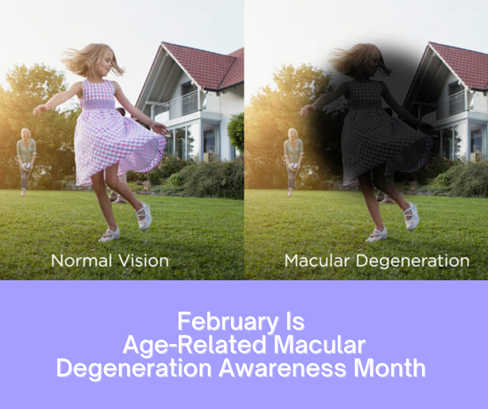Home » Blog » February is Age-Related Macular Degeneration Awareness Month
February is Age-Related Macular Degeneration Awareness Month
Posted by: Georgia Eye Associates in News

What is Age-related macular degeneration (AMD)?
AMD is a disorder of the macula. The macula is the part of your retina where your central and color vision calls home. AMD is a complex disorder where degenerative protein/lipids (called “drusen”) deposit under the retina. These deposits are seen in early macular degeneration. The retina’s structural support system breaks down as the disease progresses, allowing abnormal blood vessels to grow or leak fluid and further disrupt the retinal cells.
AMD is the leading cause of central vision loss in Americans over 50 years old. There are two types of age-related macular degeneration (AMD):
Dry or Nonexudative — This form is quite common. About 8 out of 10 people who have AMD have the dry form.
Wet or Exudative — This form is less common but much more severe. Wet AMD is when new, abnormal blood vessels grow under the retina.
What are the risk factors?
- Age: AMD affects more than 2 million Americans over 50 years old. The prevalence of ARMD in the USA is around 6% when 65 and almost 20% when 75 years old.
- Genetics: have a family history of AMD
- Smoking: Increases your risk for progression
- Diet: eating foods high in saturated fat (found in foods like meat, butter, and cheese)
- Have Certain Diseases: hypertension, hypercholesterolemia, cardiovascular disease
- Are Overweight
What is the treatment?
Depending on your type and severity of macular degeneration, many new and exciting treatment options can prevent further vision loss and help you regain vision, sometimes even back to 20/20. Discuss your options with your eye doctor.
Look Out for Your Eyesight
Keep up with your eye exams, maintain healthy habits, and have good safety practices. Your eyes will love you for it! February is all about LOVE. Show some LOVE to your EYES and call TODAY to schedule your appointment!

References: American Academy of Ophthalmology. This blog provides information and discussion about eye health and related subjects. The content provided in this blog and any linked materials are not intended and should not be considered medical advice. If the reader or any other person has a medical concern, they should consult with an appropriately licensed physician.
